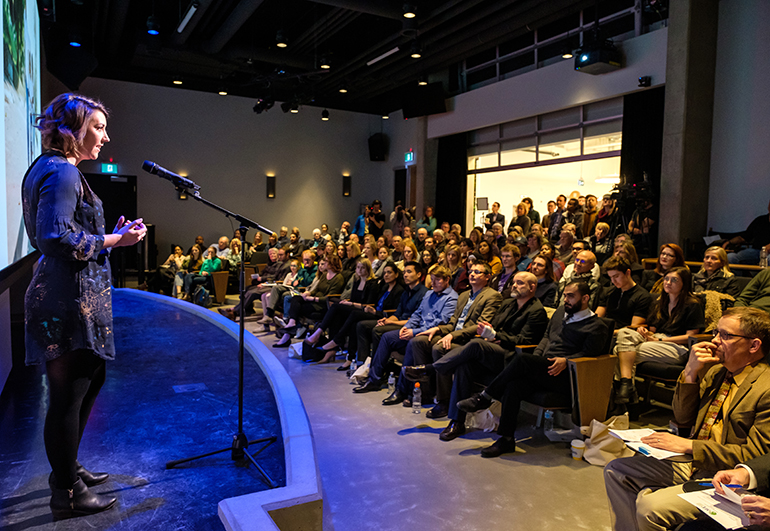
Psychology graduate student Cassidy Wallis won UBCO’s 3MT when she presented her research on how and when child abuse is reported.
Research to be shared at gala dinner for the Child Advocacy Centre
A special working relationship between a UBC grad student, the RCMP and the Kelowna Child Advocacy Centre (CAC) may lead to enhanced support and faster treatment for victims of child abuse.
PhD candidate Cassidy Wallis, supervised by psychology Professor Michael Woodworth, did her master’s thesis on how and when child abuse is reported. For her research, she collaborated with Kelowna RCMP and the CAC—coding more than 300 files on child abuse. Her work focused on identifying and understanding factors that contribute to the timing of when a disclosure of childhood abuse formally takes place.
“Providing support to parents of victims would facilitate children’s greater ability to report instances of abuse more quickly. If children report abuse when it happens, and parents are supportive, they will have greater access to psychological treatment and potentially more positive outcomes.”
Woodworth notes the relationship that Wallis formed with the CAC and the RCMP is a good example of the on-going community collaboration between UBCO and local resources.
“Sometimes people in the community aren’t necessarily aware how research coming out of the university can make a meaningful difference in their community or their lives,” he says. “This project demonstrates how research can have incredible value outside of academia and highlights the power of collaboration between agencies. This project simply couldn’t have occurred without the collaboration and support of the CAC and RCMP.”
According to CAC statistics, one in three children in Canada suffer trauma-related forms of abuse—and people who have been abused are less likely than others to graduate high school, more likely to experience unemployment and homelessness and more likely to perpetrate abuse throughout their lives.
“Reporting child abuse is a challenging subject,” says Woodworth. “While it’s a difficult issue, it’s important that children can ideally report abuse right away or have resources to facilitate disclosing abuse sooner. Wallis’s research proved to be important and has all sorts of potential benefits to both our community in general as well as to invaluable services like the CAC.”
Wallis’ research determined that if frontline workers had additional knowledge on how to understand and support children, it could lead to earlier disclosures of abuse. She also concludes that perpetrators are more likely to be caught with earlier disclosure because evidence would be more readily available.
Wallis will speak about her research project at an upcoming gala dinner in Kelowna on November 21. Organized by the Kelowna Foundation for Hope and Social Innovation, the event is a fundraiser to finish building and begin operating the new CAC, which will be the first of its kind in the community.
CACs are community-based programs that aim to treat and support abused children, youth and their families. Kelowna’s CAC is a collaborative effort by the RCMP, Interior Health, and the Ministry for Child and Family Development and will feature a multidisciplinary team on site. When the new centre opens next year, it will also allow for continued and further research for faculty and students.